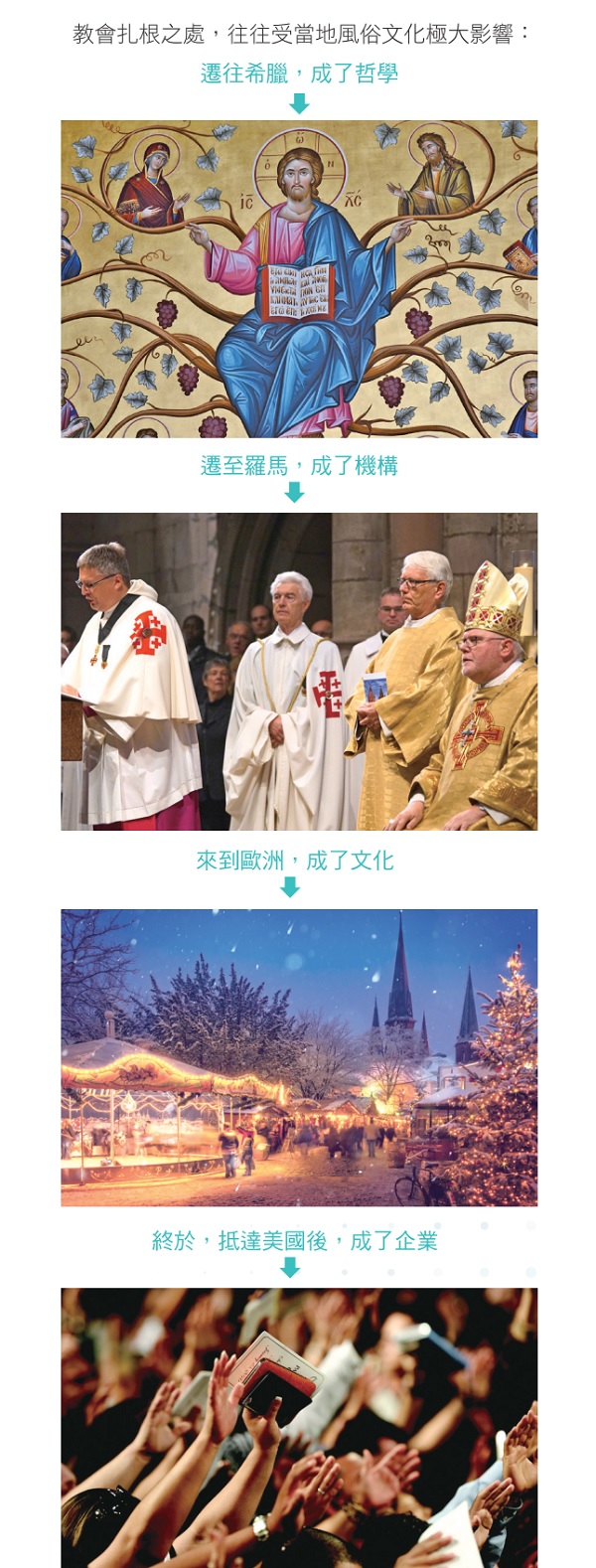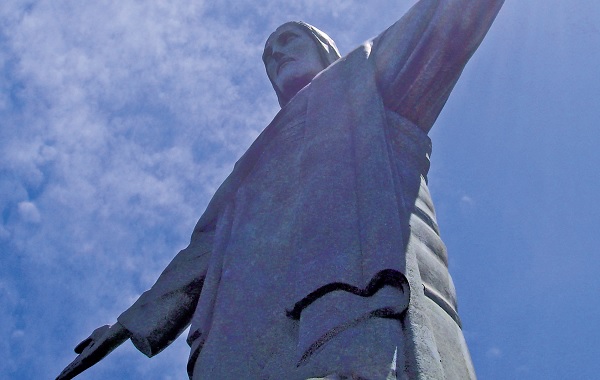Is COVID-19 the end of the modern world?
Rethinking Soteriology [New Daily Theology] Series 1
Translated by Lin Yu

The end of the "modern world"?
Former US Senate Pastor Richard Halverson once said sarcastically: "The early Jerusalem church was a group of fellowships with the resurrected Christ as the main axis. Then the church moved to Greece and became philosophy; when it moved to Rome, it became philosophy An institution; when it came to Europe, it became a culture, and finally, when it arrived in the United States, it became a business.”
Pastor Han pointed out that wherever Christianity takes root, there is always a tendency to be overly influenced by local customs and culture. However, considering the development process of orthodox Christianity, it is actually closely related to the migration of the church from Jerusalem to Greece to Rome and so on. This must be God's arrangement.
For example, the ecumenical councils of the 4th and 5th centuries derived from the Christology and trinitarian theology that later Christians believed in, such as Nicaea in 325 and Nicaea in 381. Constantinople (Nicaea-Constantinople), Chalcedon in 451, etc., were actually based on the imperial decree of the Roman emperor and were discussed and dialectically discussed using Greek philosophical vocabulary.
Pastor Han’s observation deserves re-examination. In particular, I hope to examine whether the beliefs we took for granted before the epidemic have been unknowingly overly influenced by the "modern world" of the past.
I say "in the past" because COVID-19 could very well be the beginning of the end of the modern world. Please note that I said "the end of the modern world", not "the end of the world". Unfortunately, the reason some overzealous Christians believe this is often out of a misplaced fear of the return of Christ and related events, rather than a healthy, living hope that Christ will usher in the kingdom of God in the last days.
The scriptures do say that "no one knows that day or hour." And since the coming of the Holy Spirit at Pentecost, we have officially been living in the so-called "last days." Only time will tell whether Jesus will come back while we are still alive. Come, or we may well be, as the late Richard John Neuhaus put it, just the "early church."
In other words, even if it is difficult to be sure that the new coronavirus is a genuine "sign" of the coming apocalypse, what is certain is that what is happening now symbolizes the end of the world as we know it.
Let’s look at how these modern mechanisms that were originally taken for granted are struggling to cope with the impact of the new coronavirus; the intensified social, political, economic, and cultural development has pushed us to the edge of the “brave new world” in many ways . Of course, while not exactly what Huxley imagined in his 1932 novel, “beautiful” and “new” aptly describe the dystopian world we are heading straight for.
Over the past year or so, "thanks" to modern technology and social media, large-scale social and geopolitical changes and fluctuations have had either positive or negative impacts. In fact, it was already turbulent before COVID-19, but the political environment caused by the epidemic caused the situation to take a turn for the worse. For example, the tragic death of George Floyd became an irreversible turning point for the already racially polarized United States; the Hong Kong government made permanent changes in response to public protests. These changes will continue and intensify.
Can the United States still be called a "United" country when there is no longer a common national expression, and there is no longer a consistent position or explanation for the same event, whether it happened in the past or now? Even if a system like "democracy" can still survive, can it be preserved in its current form? After the workplace and learning are moved to the online space, in addition to changing people's lifestyles, what other deeper and broader impacts may there be? When international tourism becomes more subject to policies, what new understanding will it give us of the world?
The modern world always wants to move towards "global citizenship", and the diversity and multiculturalism that it aspires to and exalts also hinders national and international unity. Therefore, "modern" inventions such as social media, while allowing people to connect faster and more conveniently, also threaten the unity of the community by becoming a medium for political commentary and discussion. How will these phenomena and concepts develop in the post-epidemic era? What beliefs can give us a definite track to follow in an uncertain future?

The “new everyday” of theology?
Many people are asking whether there will ever be a return to "normal," referring to modern life as we knew it before COVID-19. There is also a consensus that in this chapter of world history, some kind of "new normal" will emerge. It is not yet known whether the "new normal" will continue or end the pre-COVID-19 modern life as we know it. My own guess is that the "end" of pre-COVID life such as politics, economics, remote work and education, as well as the challenges encountered by international travel and "global citizenship" will cast a shadow on the fragile continuation of modern life after the epidemic. .
When thinking about the new daily life after the epidemic, let us also take a look at whether the theological and ecclesiological structures passed down by evangelicals are enough to cope with it? If it is a completely true and healthy theology and ecclesiology, it should be possible; otherwise, shouldn’t we try to move in this direction as much as possible, after all, this is “healthy reality”?
As I "scrutinize the times," I would like to focus on three doctrines that deserve to be deconstructed and then reconstructed, with the goal of revising the "diachronically-universal" view from a "contextually-born" perspective. Knowledge of the truth of Christ. I hope that after experiencing the significant impact of the epidemic, these reflections can make evangelicals have a clearer understanding of faith and practice.
The three themes are:
1. A personal-centered understanding of salvation overemphasizes certain parts of the gospel, thereby neglecting arguably more important parts;
2. It is an unhealthy American preference to turn the church into a consumer “enterprise” and separate pastoral care and discipleship from real personal relationships;
3. What impact do these two deviated trajectories have on our understanding of what "people" are?
As we enter the post-epidemic era of the 21st century (that is, the real "postmodern"), there are at least three theological threads that require "new daily life":
1) soteriology; 2) ecclesiology; 3) anthropology. Let’s look at soteriology first, and then continue to reflect on ecclesiology and man in subsequent articles.
How to define "salvation"?
When Martin Luther proposed to restore the teaching of "justification" in order to fight against the over-emphasis on "works" of the 16th-century Catholic Church, the result was that he did not reform the entire church according to his original intention. On the contrary, it accidentally split the Western church into two parts, becoming Roman Catholicism and Protestantism. From the latter, today's evangelicalism was derived. At that time, in order to compete with the indulgent and corrupt Roman Catholic Church, it was necessary to redefine soteriology. For Luther, the most important quality of salvation is righteousness in Christ "once and for all" through God's grace through faith in Christ and His death on the cross. The present moment of achievement belongs to us personally. Our sins are first imputed to Christ, and His righteousness is imputed to us. This is what is called a blessed exchange.
Unfortunately, in the hands of Philip Melanchthon, who succeeded Luther, this indicator of "justification by grace alone through faith" formulaically flattened the concept of salvation and presented a picture of a heavenly court - in the holy Before God, sin must be dealt with through the law. By imputing the righteousness of Christ to us, God declares us righteous through a "forensic declaration." This "court pronouncement" frees believers from the eternal damnation of sin.
Such metaphors certainly describe one aspect of salvation, but there is a problem if it is used as the only or main aspect.
For fear that Lutheranism would overemphasize justification and lead to a life of neglecting the law, John Calvin deliberately removed the word "sanctification" from the section dealing with salvation in his Institutes of the Christian Religion. Before justification. In the past, evangelical "crucicentrism" (emphasis on Jesus' achievements on the cross) focused on the Lutheran theory of justification, combined with Calvin's "penal substitution theory" Substitutionary atonement, we can understand why many evangelical believers have difficulty explaining the redemptive meaning of Christ’s resurrection.
If the word "salvation" is narrowly defined as: "justification by faith, so we can personally go to heaven," it is easy to break away from God's ongoing "redemption" of our lives and this world.

▲In order to compete with the church that overemphasized "works," Martin Luther proposed "justification by grace through faith alone." However, later Christians narrowly defined salvation as "the forgiveness of sins."
"Redemption" relationship
By the grace of God and by the gift of the Holy Spirit, we are called, inspired, and equipped to participate in such an active work of redemption, not through flat legal formulas, but through a full union with Christ. Practical union with Christ is more fundamental to soteriology than justification, sanctification, and future glorification. Therefore, explaining "salvation" in terms of redemption broadens the short-term perspective of the law; such redemption highlights that the root cause of sin lies in "broken relationships" rather than just "violating the law."
An emphasis on "breaking the law" often leads to what Dallas Willard calls "gospels of sin management"; an emphasis on "relationships" can lead to what Dallas Willard calls "gospels of sin management". Talk about the concept of "salvation is filial before it is forensic" (salvation is filial before it is forensic). In this way, the positive aspect of salvation, "adoption," and all its attendant benefits, rather than just the negative aspect of justification, can properly be seen as a privilege.
In addition, the Trinity is a connected relationship, so it is more reasonable to look at salvation centered on relationship. What's more, there must first be a relationship before personality can be formed.

▲The salvation completed by Jesus lies in redeeming the relationship between man and God, man and man, man and himself, and man and creation. His redemption enables us to be accepted as children of God.
I really like that someone once proposed that salvation involves four levels of redeemed relationships: a redeemed relationship with God; a redeemed relationship with others; a redeemed relationship with self; and a redeemed relationship with all creation.
Emphasizing the positive aspect of being in Christ, that is, receiving sonship, allows us to be adopted by God the Father through the Holy Spirit in Christ and be accepted by Him as children. This means that we can now live in this new kinship, and thereby live in these four levels of redeemed relationships in an "already, but not yet" way. By focusing on the positive aspects of salvation rather than just the negative aspects, we naturally seek to live in the fullness and prospect of new life that Jesus offers through the cross and resurrection. In other words, because of our status as children of God, we can live in and live out the future of redemption in this life.
I am gratified to see from the scriptures that the concept of justification by faith is mentioned only in specific circumstances in Paul’s letters; the theme of adoption is present throughout the New Testament, including Paul’s letters. From this we can see the focus of soteriology. Looking further, justification has become prominent in the guilt-based culture of Western Christianity, and it has its origins. This also shows that justification should not be the only and ultimate meaning of salvation as evangelicals usually think, especially when comparing the shame-based culture of Asia and the fear-based culture of Africa (see The 3D Gospel, Jayson Georges).
I believe that rethinking ecclesiology and humanism in the following series of articles will make it increasingly clear to us why the above-mentioned revision of concepts is crucial in the post-epidemic world.
Considering the COVID-19 and all the social, political, and cultural changes brought about during this period, the soteriology we need must be enough to participate in the historical facts we know and experience from the perspective of redemption. How can a soteriology that is abridged, focusing solely on one's legal standing before a holy God, see Christ as, as Peter puts it, "a living hope?"
The four levels of redemptive relationships mentioned earlier depict such constructive potential. How we understand salvation from a broad perspective and theology—rather than just formal dogma—will affect how we live out our heavenly lives on earth. At the same time, it will also affect our understanding of the nature of the church and its role in the world. Perhaps more importantly, it affects our understanding of ourselves as human beings created in the image of God. These will be discussed in subsequent articles.
 Pastor Wen Yongxu Rev. Dr. Clement Wen, currently serves as an Assistant Professor of Systematic Theology at China Evangelical Theological Seminary in Taiwan. He served as the youth pastor of the Chinese Bible Church in Maryland (2010-2015), and later obtained a doctorate from the University of Edinburgh in Scotland. Pastor Wen is the son of Professor Wen Yingqian, the former chairman of the board of directors of KRC. He and his wife Lu Xiaojun have two sons, Ethan and Micah.
Pastor Wen Yongxu Rev. Dr. Clement Wen, currently serves as an Assistant Professor of Systematic Theology at China Evangelical Theological Seminary in Taiwan. He served as the youth pastor of the Chinese Bible Church in Maryland (2010-2015), and later obtained a doctorate from the University of Edinburgh in Scotland. Pastor Wen is the son of Professor Wen Yingqian, the former chairman of the board of directors of KRC. He and his wife Lu Xiaojun have two sons, Ethan and Micah.
